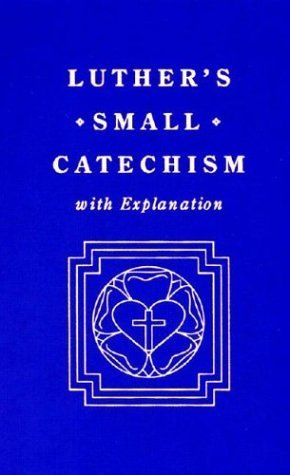What do you think?
Rate this book


268 pages, Hardcover
First published January 1, 1529
HALLOWED BE THY NAME
“God’s name is hallowed when His Word is taught in its truth and purity, and we as the children of God live holy lives according to it. This grant us, dear Father in heaven! But he who teaches and lives otherwise than the Word of God teaches dishonors God’s name among us. From this preserve us, heavenly Father!”
AND FORGIVE US OUR TRESPASSES, AS WE FORGIVE THOSE WHO TRESPASS AGAINST US
“But we pray that He would give us everything by grace, for we daily sin much and deserve nothing but punishment; and we on our part will heartily forgive and readily do good to those who sin against us.”
PASTORS AND PREACHERS
“A bishop must be blameless, the husband of one wife, temperate, sober-minded, of good behavior, hospitable, able to teach; not given to wine, not violent, not greedy for money, but gentle, not quarrelsome, not covetous; one who rules his own house well, having his children in submission with all reverence…not a novice….holding fast the faithful word as he has been taught, that he may be able, by sound doctrine, both to exhort and to convict those who contradict. 1 Timothy 3:2-4 and 6; Titus 1-9.”
CIVIL GOVERNMENT
“Let every soul be subject to the governing authorities. For there is no authority except from God, and the authorities that exist are appointed by God. Therefore whoever resists the authority resists the ordinance of God, and those who resist will bring judgment on themselves. For rulers are not a terror to good works, but to evil. Do you then want to be unafraid of the authority? Do what is good, and you will have praise from the same. For he is God’s minister to you for good. But if you do what is evil, be afraid; for he does not bear the sword in vain; for he is God’s minister, an avenger to execute wrath on him who does evil. Romans 13:1-4.”
CITIZENS
“Render to Caesar the things that are Caesar’s, and to God the things that are God’s. Matthew 22:21.
Therefore you must be subject, not only because of wrath but also for conscience’ sake. For because of this you also pay taxes, for they are God’s ministers attending continually to this very thing. Render therefore to all their due: taxes to whom taxes are due, customs to whom customs, fear to whom fear, honor to whom honor. Romans 13:5-7.”
EMPLOYEES
“Servants, be obedient to those who are your masters according to the flesh, with fear and trembling, in sincerity of your heart, as to Christ; not with eyeservice, as men-pleasers, but as servants of Christ, doing the will of God from the heart, with good will doing service, as to the Lord, and not to men, knowing that whatever good anyone does, he will receive the same from the Lord, whether he is a slave or free. Ephesians 6:5-8.”